MercoPress. South Atlantic News Agency
Chile's ENAP announces diesel production from used cooking oil
 Although environmentally friendly, ENAP's diesel remains more expensive to produce than regular diesel fuel
Although environmentally friendly, ENAP's diesel remains more expensive to produce than regular diesel fuel Chile's state-run oil company ENAP (Empresa Nacional del Petróleo) announced Wednesday that the South American country has proven able to produce renewable diesel out of used cooking oil. “A new step towards a greener Chile! ENAP presents its new renewable diesel, made from used cooking oil,” a statement read.
The company produced this fuel at its Aconcagua refinery in the commune of Concón from used oil collected from restaurants and fast-food establishments in the nearby city of Valparaíso. ENAP highlighted that this process reduces the carbon footprint by 80% compared to traditional diesel production. This diesel can be used for transport, heavy machinery, and even aviation, it was explained. However, ENAP's low-carbon renewable diesel remains more expensive than the traditional one due to production costs.
The “Enap Renewable Diesel” process was verified by an independent certifier who confirmed the reduction of the carbon footprint compared to traditional diesel. The processing of the test volume allowed a reduction in emissions of approximately 1,000 tons of CO2 equivalent.
ENAP CEO Gloria Maldonado underlined that “the energy of tomorrow is produced today; and the ENAP of the future is one that advances responsibly towards the generation of low-carbon fuels, in line with our relevant role as a state-owned company.”
“Producing renewable fuels is a key point in our Strategic Plan 2040, with which we aspire to be protagonists in the decarbonization of the country, providing fuels with less environmental impact,” she added.
“The success of this development, carried out in one of our refineries, allows us to broaden our fuel offer, incorporating solutions with a lower CO2 footprint for our clients and end consumers. In fact, we have already signed agreements to develop and market this type of fuel,” ENAP's General Manager Julio Friedmann also pointed out. “This milestone in our energy history demonstrates the commitment of Enap's workers to the country and is a reflection of the internal epic that generates the motivation to be able to contribute to a better environment and quality of life for Chileans,” he added.
“This milestone demonstrates, once again, that Empresa Nacional del Petróleo is at the forefront in terms of innovation and technological development on the road to energy transition. The use of low-emission fuels is part of the mitigation measures of our Energy Sector Climate Change Plan and is a very important step in the commitment assumed as a country to reduce our carbon footprint,” Energy Minister Diego Pardow noted.
Biofuels have been around for decades. First-generation biofuels are made from various virgin oils, such as soybean oil, corn kernels, or sugar cane. Advanced biofuels from the second generation onwards are processed from different residues such as used cooking oil, waste animal fats, or waste from the forestry industry, among others.




Top Comments
Disclaimer & comment rulesCommenting for this story is now closed.
If you have a Facebook account, become a fan and comment on our Facebook Page!